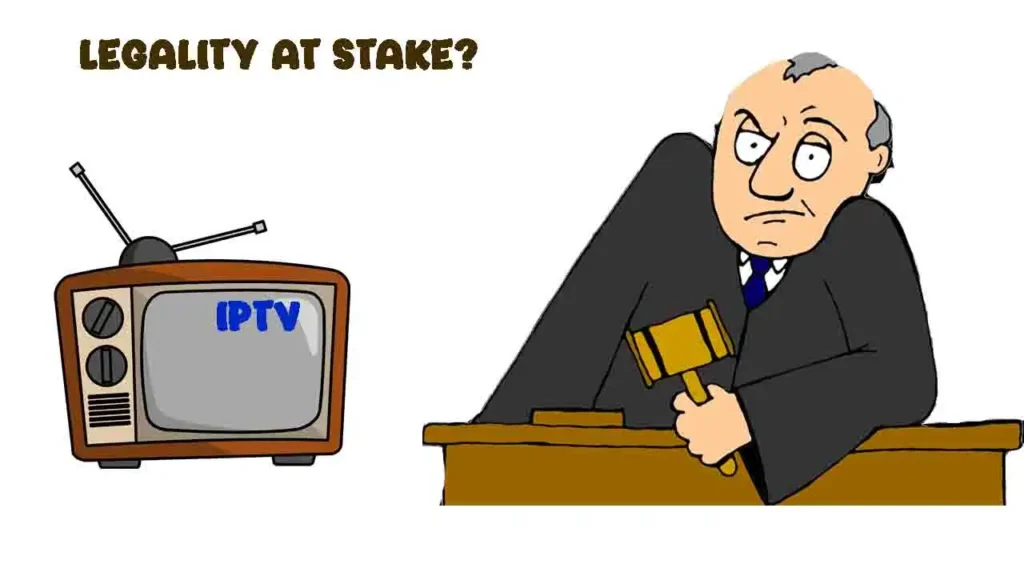A few years ago, the idea of watching live TV without a cable subscription felt like science fiction. Today, IPTV has shattered that reality—offering instant access to channels worldwide, often for a fraction of the price. But with convenience comes controversy. So will IPTV be legal in the future?
Some IPTV services are fully licensed, operating within the law. Others? A digital cat-and-mouse game, with unauthorized providers hopping from server to server, always one step ahead of enforcement. Governments are tightening regulations. Lawsuits are flying. But can IPTV be stopped?
- Are we heading toward full legalization—or total shutdown?
- What loopholes still exist, and how long will they last?
- How do industry experts see this playing out in the next five years?
The answers aren’t simple—but they’re here. Let’s break it down.
Table of Contents
2. The Current Legal Landscape: What Determines IPTV’s Legality?
IPTV is like a double-edged sword. On one side, it’s the future—on-demand content, no contracts, complete freedom. On the other? A legal mess, tangled in copyright laws, lawsuits, and police raids. People assume “IPTV” means the same thing everywhere, but that’s where they’re wrong.

What’s Legal, What’s Not?
- Legal IPTV: If a service has contracts with broadcasters, it’s just another streaming platform. Think Hulu Live, YouTube TV, Sling TV.
- Illegal IPTV: If it’s streaming premium channels without permission? That’s straight-up copyright infringement. Some providers pretend to be legal but operate in the shadows, hopping from server to server like digital fugitives.
How Different Countries Are Cracking Down
USA: DMCA takedowns, lawsuits, and major busts. The ACE coalition (Alliance for Creativity and Entertainment) is wiping out pirate IPTV networks one by one.
UK: IPTV resellers can be charged with fraud, not just copyright violations. Authorities have even gone after individual users who knowingly stream illegal content.
EU: The 2019 Xtream Codes raid was a nuclear strike—50 million users left in the dark overnight.
Canada & 🇦🇺 Australia: Governments force ISPs to block IPTV domains at the network level. No access, no problem—unless you use a VPN.
Middle East & Asia: Some places treat IPTV piracy as a criminal offense, handing out real prison sentences to operators.
The Most Brutal IPTV Crackdowns
💥 Xtream Codes (2019): A European-wide raid took down thousands of IPTV services overnight.
💥 IPTV Smarters Lawsuit (2023): Forced to strip major features after legal pressure.
💥 Operation 404 (Brazil, 2024): A worldwide crackdown targeting resellers, providers, and even website hosts.

Read also: The Famous IPTV Crackdowns 2025
So, Where Does IPTV Go From Here?
Governments are turning up the heat. But pirate IPTV isn’t going away—it’s adapting. VPNs, decentralized hosting, encrypted streaming—every takedown spawns a dozen new solutions.
The question is: Will IPTV go legit, or will governments go for total extinction? Experts weigh in next.
3. Expert Insights: What Lawyers, Regulators & Industry Leaders Say
IPTV has forced its way into the mainstream, but the battle over its legality is far from settled. Broadcasters, regulators, and law enforcement agencies are tightening the screws, while IPTV providers keep finding new ways to survive. The question isn’t just whether IPTV will remain legal—it’s whether it can even be stopped.
The Media & Telecom Industry: “IPTV Must Be Controlled”
For media giants, IPTV is more than just piracy—it’s an existential threat. Networks spend billions on exclusive content rights, only to watch IPTV platforms stream those same programs without paying a dime.
- Licensing deals at risk – Major networks rely on agreements that dictate where and how content can be broadcast. IPTV bypasses those restrictions entirely.
- Geo-restrictions undermined – Legal streaming platforms enforce territorial rights, but IPTV makes every channel available worldwide.
- Advertisers losing money – Traditional networks and streaming services depend on ad revenue. IPTV removes them from the equation completely.
Broadcasters aren’t sitting idle. They’re pushing for stricter laws, stronger ISP-level blocking, and real-time content recognition that can detect and disable unauthorized streams automatically.
Cybersecurity & Digital Rights Lawyers: “IPTV is Getting Harder to Kill”
Legal experts recognize a harsh reality—completely eradicating IPTV is next to impossible. Even when governments shut down major IPTV networks, others emerge in their place, often more decentralized and resistant to enforcement.
- Decentralized hosting – Some IPTV services now use peer-to-peer (P2P) streaming, blockchain hosting, and rotating server networks to avoid takedowns.
- VPNs and encryption – Even if a country blocks access to IPTV domains, users can bypass restrictions using VPNs, proxies, and encrypted DNS.
- Legal loopholes – Many IPTV providers host their servers in jurisdictions with lax copyright enforcement, keeping them outside the reach of international takedown requests.
Instead of complete bans, some legal experts predict a shift toward regulating and licensing IPTV, similar to how the music industry adapted to streaming after years of battling piracy.
Law Enforcement: “IPTV Piracy is No Longer a Low Priority”
Authorities once treated IPTV as a minor issue. Not anymore. As pirate IPTV networks grow into multi-million-dollar operations, law enforcement is escalating its response.
- International crackdowns – Interpol and Europol now conduct cross-border raids, shutting down IPTV operations that span multiple countries.
- Fraud and organized crime charges – IPTV is no longer just a copyright issue. Some governments now treat large IPTV operations as financial fraud or even organized crime.
- ISP cooperation – Internet service providers are being forced to monitor, detect, and block IPTV traffic, cutting off access at the network level.
The crackdown is real, but IPTV isn’t disappearing. With new tools, new hosting methods, and an ever-growing demand, the battle is far from over.
4. The Future of IPTV: Scenarios & Predictions
IPTV won’t just vanish. That much is clear. But what happens next? That’s where things get messy. Some say regulation is the only way forward. Others think the crackdown will be so severe that IPTV, as we know it, won’t survive. And then there’s the wildcard—pirate IPTV mutating into something even harder to control.
Let’s walk through what the future could look like.
IPTV Goes Legit (But Not for Cheap)
Maybe the industry doesn’t die—it evolves. Instead of playing cat and mouse with governments, IPTV services buy proper licenses, partner with content creators, and rebrand as premium platforms.
- No more legal headaches, but say goodbye to dirt-cheap IPTV subscriptions.
- Networks and governments tighten the rules, regulating IPTV like traditional TV.
- Legitimate IPTV providers start competing with Netflix and Amazon Prime, offering their own streaming bundles.
This would be the safest path for IPTV, but also the most expensive for users.
You may also want to read: How to Stream Live Sports for Free
Pirate IPTV Becomes Unstoppable
If history has taught us anything, it’s this: when piracy gets attacked, it adapts. If one IPTV service shuts down, five new ones take its place. The next generation of IPTV could be untouchable.
- Blockchain-powered IPTV – Fully decentralized, no servers to seize.
- AI-driven evasion tactics – IPTV services that move faster than enforcement agencies can track.
- Encrypted peer-to-peer streaming – No middlemen, no providers to arrest, no central platform to take down.
If this happens, IPTV doesn’t just survive—it becomes the Hydra of digital streaming. Cut off one head, and two more grow in its place.
IPTV Gets Criminalized for Viewers
Maybe governments decide that cracking down on providers isn’t enough. Maybe they start going after users.
- ISPs monitor and report illegal IPTV traffic.
- Viewers receive fines or legal warnings for using unlicensed IPTV services.
- Authorities push for jail time for repeat offenders, similar to past anti-piracy laws.
Sound extreme? It’s already happening in Italy, the UK, and parts of the EU. The risk of using unlicensed IPTV could become as high as torrenting was in the early 2000s.
The Middle Ground: Legal & Pirate IPTV Coexist
Not every revolution ends in war. Maybe the industry finds a balance. Legal IPTV expands, but pirate services still exist in the shadows, much like torrent sites today.
- Big IPTV platforms offer affordable, ad-supported models to attract users away from illegal services.
- Governments focus on taking down large-scale resellers, instead of hunting every single user.
- IPTV piracy remains a gray area—not completely wiped out, but not a high-priority enforcement target.
This scenario is the most realistic in the short term. IPTV piracy won’t disappear, but users may start shifting toward safer, legal options—if the industry gives them a reason to.
Will IPTV be Legal or Be Shut Down?
IPTV isn’t just another tech trend—it’s a direct challenge to the traditional TV industry. The battle isn’t about whether people want IPTV (they clearly do). It’s about who controls the future of television.
There’s no single ending to this story. IPTV might evolve into a fully legal, regulated industry, with governments forcing providers to follow strict licensing laws. It might go underground, adopting decentralized technology to stay one step ahead of enforcement. Or, it might follow the same path as torrenting—never fully disappearing, but constantly under attack.
What’s clear is that this fight isn’t over.
- Governments are increasing enforcement, but IPTV networks are finding ways to adapt.
- Users aren’t giving up on IPTV just because of legal pressure. If anything, demand is still growing.
- Tech innovation is making IPTV harder to block, not easier.
So, is IPTV doomed? Not yet. But the industry is at a crossroads. Either it adapts to survive legally, or it stays in the shadows—forever playing a game of cat and mouse with the law.
The next few years will determine which path IPTV takes. One thing’s for sure—it won’t disappear quietly.
